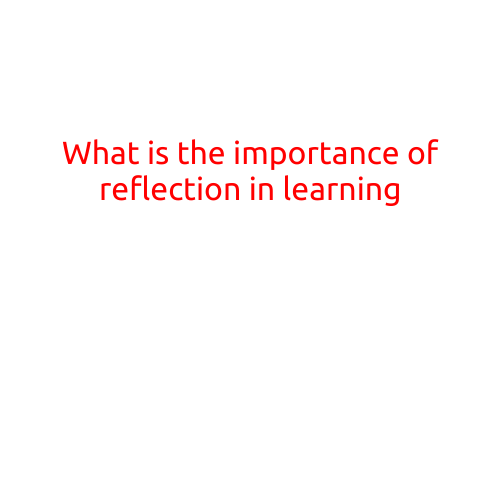
What is the Importance of Reflection in Learning?
Reflection is a process that involves thinking about and analyzing your experiences, thoughts, and feelings to learn and improve. In the context of learning, reflection is a crucial component of the learning process, as it helps individuals to process and make sense of the information they have learned. In this article, we will explore the importance of reflection in learning and how it can enhance the learning experience.
What is Reflection in Learning?
Reflection in learning is the process of deliberately examining and analyzing one’s own learning, experiences, and performance. It involves setting aside time to think about what was learned, what worked well, and what didn’t, and then using that knowledge to adjust one’s approach or improve future performance. Reflection can be done individually or in groups, and it can be facilitated through various methods, such as self-reflection, peer feedback, or mentorship.
Why is Reflection Important in Learning?
Reflection is important in learning because it helps individuals to:
- Process and Retain Information: When we reflect on what we have learned, we are more likely to retain that information and make it meaningful. Reflection helps to solidify learning by reinforcing the connections between new information and prior knowledge.
- Identify Strengths and Weaknesses: Reflection helps individuals to identify their strengths and weaknesses, which is essential for setting goals and improving performance.
- Develop Critical Thinking: Reflection requires critical thinking, which involves analyzing information, identifying patterns and relationships, and drawing conclusions.
- Build Self-Awareness: Reflection helps individuals to develop a deeper understanding of themselves, including their motivations, values, and goals.
- Develop Problem-Solving Skills: Reflection involves analyzing and evaluating experiences, which helps to develop problem-solving skills and the ability to think creatively.
- Enhance Transfer of Learning: Reflection helps to ensure that learning is transferred from one context to another, so that new skills and knowledge can be applied in different situations.
How Can Reflection be Incorporated into the Learning Process?
There are several ways to incorporate reflection into the learning process:
- Keep a Learning Journal: Writing down thoughts, feelings, and insights can help to process and reflect on learning experiences.
- Participate in Peer Feedback: Sharing thoughts and feedback with peers can facilitate reflection and provide new perspectives.
- Engage in Self-Reflection: Set aside time to reflect on your own learning, experiences, and performance.
- Set Goals and Objectives: Setting goals and objectives can help to focus reflection and provide a sense of direction.
- Use Self-Assessment Tools: Utilize self-assessment tools, such as rubrics or checklists, to guide reflection and evaluate performance.
Conclusion
Reflection is an essential component of the learning process, as it helps individuals to process and retain information, identify strengths and weaknesses, develop critical thinking and problem-solving skills, and build self-awareness. By incorporating reflection into the learning process, individuals can enhance their learning experience, improve performance, and achieve their goals.





